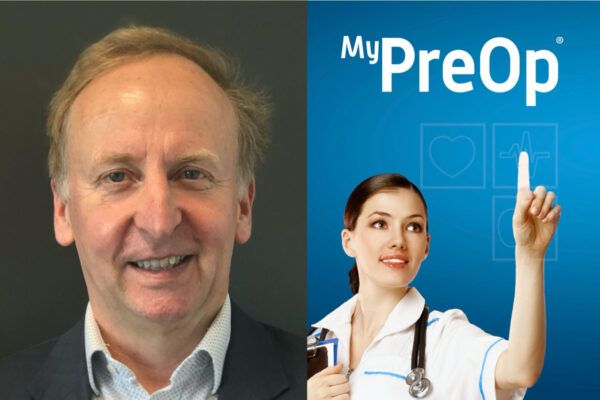COVID-19: An innovator’s perspective

Paul Upton, MyPreOp (NIA 2020)
This blog was originally published as part of the AHSN Network‘s COVID-19 Lessons blog series on 1 September 2020.
Dr Paul Upton is an NHS Innovation Accelerator (NIA) Fellow and CEO of Ultramed Ltd, the creator of the MyPreOp® patient-driven online pre-operative assessment platform. Here he reflects on his experience as an innovator during the COVID-19 pandemic.
After 21 years as a consultant anaesthetist in the NHS, I’d retired early to set up Ultramed and try my luck as an entrepreneur. After three years of planning and development my business partner and I got our first innovation – MyPreOp®, an online patient driven preoperative assessment programme used in elective surgery – to market and were beginning to make inroads into the notoriously difficult NHS market. We’d a nice little office in Cornwall and a small team. All seemed well…
However, by February 2020 the COVID-19 crisis was clearly gathering pace. I made an emergency purchase of some laptops to ensure my team could work from home if necessary. In March I watched use of MyPreOp® fall off the proverbial cliff as all elective surgery was cancelled. With no phone calls coming in, we had to furlough our customer support team member.
I watched on as waiting lists rapidly escalated, wondering if the writing was on the wall for Ultramed.
As it happens, we’d already been thinking about how MyPreOp® could be adapted to deliver patient facing online questionnaires that could be completed before an outpatient appointment. The target was the NHS Long Term plan to reduce face-to-face appointments by 30%, just the number we’d seen with MyPreOp®. Over 8,600 companies applied for Innovate UK funding through the Business-led innovation in response to global disruption competition. Less than 10% of companies received funding but we were one of the lucky few. We are now rapidly developing 10 new online outpatient products to help reduce the need for face to face appointments.
The next thing that happened surprised me. My team said “we need to save money, we like working from home, why don’t you get rid of the office”. No rent reduction, an unusable office and all the overheads that entailed. I gave notice the next day and 30 days later we became a ‘virtual company’. It has taken a bit of getting used to, and being twice the age of any of my team they have had to coach this old guy in using things like Slack, a customer relationship management system and we’ve set up Twilio to be able to divert calls over the internet. Having already been a Zoom fanatic all I needed was to add Teams skills and I was set for the world of remote meetings.
So, we were all beavering away building outpatient related products and putting the finishing touches to a new version of MyPreOp® with a clinician portal that allows the management of individual patients and the whole preop service. We’d had great support from the South West AHSN and the NIA central team. Excellent online sessions and a strong cohort of like-minded Fellows on the NIA program were a great help. Hope was not abandoned.[rd_line type=”rd_line_bold” color=”#c9f0ff” use_icon=”yes” icon_color=”#c9f0ff” icon_size=”75″ icon=”imf-quotes-left”]
It wasn’t just that we were receiving enquires but the language from the NHS had changed. It felt as if it had gone from ‘that’s nice, we’ll think about it’, to ‘we need it now, how quickly can we implement?’ This was a substantial shift and one I think is critical to ensuring innovations like ours are able to help the NHS cope in the current situation.
[rd_line type=”rd_line_bold” color=”#c9f0ff” use_icon=”yes” icon_color=”#c9f0ff” icon_size=”75″ icon_pos=”right” icon=”imf-quotes-right”]Then the email enquires started. An initial trickle turned into what could only be described as a relative torrent. It wasn’t just that we were receiving enquires but the language from the NHS had changed. It felt as if it had gone from “that’s nice, we’ll think about it”, to “we need it now, how quickly can we implement”. This was a substantial shift and one I think is critical to ensuring innovations like ours are able to help the NHS cope in the current situation. We had two new hospitals go live in early July as they started to consider the monumental task of restarting elective surgery as the NHS ‘resets’. We un-furloughed our customer support team member.
The other huge change we saw in innovation adoption was the willingness/necessity to have remote demonstrations and implementation. Pre-COVID-19, I’d been on aeroplanes, trains, buses, cars and taxis as potential customers demanded face-to-face demos, regardless of the fact that getting to a contract seemed to take two to three years. Now, they were more than happy to have a remote meeting – the flexibility and efficiency was fantastic. Business cases were developed in record time and we developed a remote implementation process. The technology was easy but front-line staff still needed training – bring on more Zoom/Teams meetings!
So, a process that was taking years and large amounts of travel and carbon use, is now being done in a couple of months. We’ve won contracts and implemented without setting foot in the hospital, something we’d never have seen before COVID-19. We continue to have a large amount of interest and some of this is now coming from outside the UK and we hope to gain our first export contract in the coming months.
We know there is an immense backlog of patients waiting for services – I can only hope that the positive attitude towards rapid uptake of innovation seen over the last few months continues. I’m confident that helping reboot elective surgery as the NHS resets is a worthwhile contribution.
To find out more about MyPreOp® and speak to Dr Paul Upton, email: paul.upton@ultramed.co